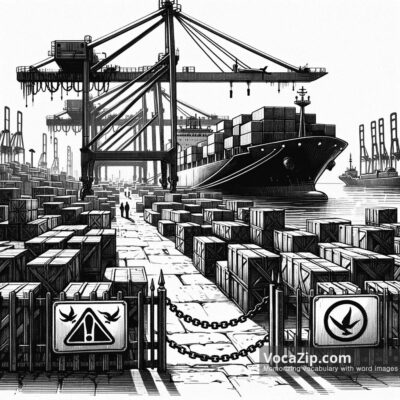embargo meaning
embargo :
ban, restriction
noun
▪ The country imposed an embargo on oil.
▪ The country put a ban on oil.
▪ There is an embargo on trade with that nation.
▪ There is a restriction on trade with that nation.
paraphrasing
▪ prohibition – ban
▪ blockade – restriction

embargo :
to ban, to restrict
verb
▪ They embargoed the export of goods.
▪ They banned the export of goods.
▪ The government embargoed all trade.
▪ The government restricted all trade.
paraphrasing
▪ ban – to restrict
▪ restrict – to limit
▪ prohibit – to stop
▪ forbid – to not allow
Pronunciation
embargo [ɛmˈbɑːrɡoʊ]
The stress is on 'bar' and sounds like 'em-bar-go'.
Common phrases and grammar about embargo
embargo - Common meaning
noun
ban, restriction
verb
to ban, to restrict
Part of Speech Changes for "embargo"
▪ embargoed (adjective) – banned or restricted
▪ embargoing (noun) – the act of banning or restricting
Common Expressions with "embargo"
▪ impose an embargo – to put a ban
▪ lift an embargo – to remove a ban
▪ trade embargo – a ban on trade
▪ oil embargo – a ban on oil trade
Important examples of embargo in TOEIC
Vocabulary examples from the TOEIC test
In TOEIC vocabulary questions, embargo often refers to a trade ban or restriction.
Example of a confusing word: embark (to begin a journey)
Grammar examples from the TOEIC test
Embargo is used as both a noun and a verb in TOEIC questions, often related to trade restrictions.
embargo
Idioms and fixed expressions in TOEIC
oil embargo
'ban on oil trade', often used in economic contexts.
lift an embargo
means 'to remove a ban', often used in diplomatic contexts.
Differences between similar words and embargo
embargo
,
blockade
differences
Embargo is a ban on trade, while blockade is a physical barrier to stop movement.
embargo
,
ban
differences
Embargo is often used for trade, while ban can be used for various prohibitions.
Words with the same origin as embargo
The origin of embargo
embargo comes from the Spanish 'embargar', meaning to stop or block.
Word structure
It has the prefix em (in), root barg (bar), suffix o (noun/verb), and means 'to bar in'.
Words with the same origin
The root of embargo is barg (bar). Words with the same root include bar (to block), barrier (a block).
Please select an image in the quiz
Previous post and next post


equivalent
1956
equal, same
adjective ┃
noun ┃
Views 3






